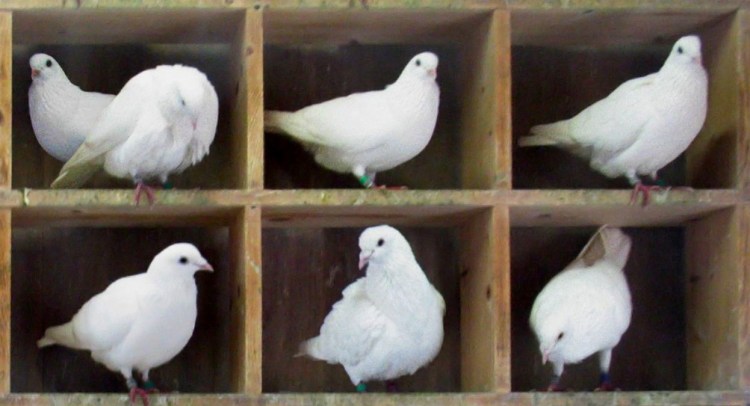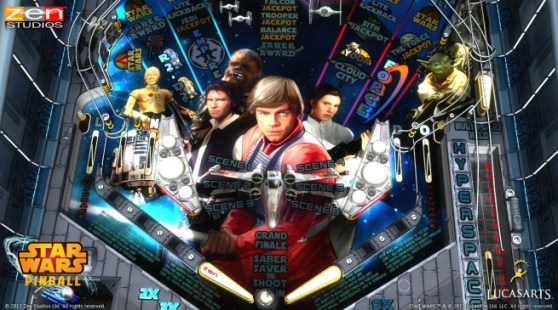
Above: It’s pinball plus Star Wars, or, as I call it, The Geek Sandwich.
Zen Studios
If you’ve played pinball on any device capable of running games lately, odds are Zen Studios made it. The developer’s extensive Pinball FX and Zen Pinball platforms boast realistic physics and original tables with licenses including Star Wars and the Marvel comic-book universe.
The studio has made its name and reputation in pinball, and it’s hard to separate the two. And yet it released two games last year that were decidedly un-pinball: the tower-destruction/real-time strategy title CastleStorm, and KickBeat, a rhythm/fighting game for the PlayStation Vita portable system. I talked to Zen’s vice president of publishing, Mel Kirk, about how these projects came about.
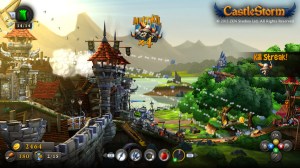
Above: CastleStorm includes exploding sheep that you fire from a giant ballista.
“We actually needed to convince ourselves that games like CastleStorm and KickBeat were good ideas,” he said. “When it came down to it, we had to ask ourselves, ‘What do we really want to do with the money we have been so lucky to make from pinball?’ Do we want to take it to the bank, save it for a rainy day and just make more pinball, or do we want to step out into the deep end and work on games that we want to make, no matter what the outcome may be? The answer to those questions was very easy, but also a bit scary.”
Worse things can happen than having people associate your company with awesome pinball games, but I wondered if Zen faced any hurdles in promoting its other projects.
“Tying our new games to ‘from the makers of Pinball FX2’ does not mean much when you are making a game so far departed from that genre,” Kirk said. “CastleStorm and KickBeat are games that do not necessarily fit into a genre category; they are really super-genre mashups. We had to give them their own space and campaign and hopefully their own fan bases.”
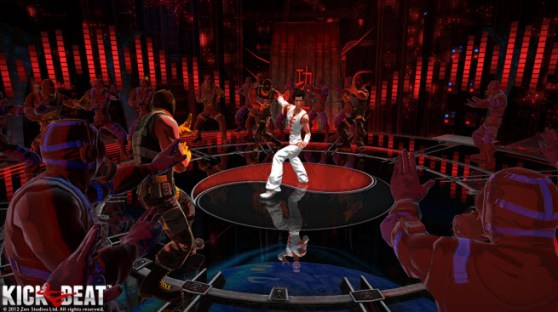
Above: KickBeat has you tapping buttons in time to music to survive a series of kung-fu-film-style, 1 vs. 100 fights.
Not being able to use the established work for a good marketing hook is certainly risky, but CastleStorm and KickBeat hold their own independently of the flippers and lights. In the end, Kirk explains, they didn’t really have anything to prove.
“The nice thing about being an independent studio is that we have more realistic sales targets. In fact, we’re happy if a project breaks even and we can keep making games we believe in. It is never a case of falling short. It’s more about how high can we go.”
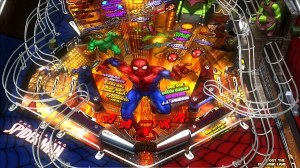
Above: Is he strong? Listen, bud. He has pinballs in his blood.
Zen has since returned to its silver-balled mainstay, releasing seven more Star Wars pinball tables and a soccer-themed pack. It has also ported its existing projects to any platforms they might have missed the first time around.
Not that CastleStorm and KickBeat have run their course, however. CastleStorm launched on Nintendo’s Wii U console in December, and a PC port of KickBeat came out earlier this year with a “Special Edition” for current-gen consoles also in the works.
So basically, Zen is fine and will continue to do whatever it feels like, even if it is pinball. Sometimes you just feel like pinball, you know?
Double Fine Productions

Above: It raised a buck or two. Or $3.3 million.
This plucky indie studio, which is the reason that most gamers know that Kickstarter exists, has its own novel solution to the typecasting problem: It almost never makes the same kind of game twice.
Here’s a quick list of some of the genres Double Fine has covered since its founding in 2000: platforming, character-action, real-time-strategy, tower-defense, point-and-click adventure, role-playing, puzzle, third-person shooter, motion-controlled family titles, simulation, augmented-reality, and music/rhythm.
I spoke with chief operating officer Justin Bailey and senior publishing manager Greg Rice to see how the hell they keep this up.

Above: Double Fine isn’t ruling out sequels, though.
“Tim [Schafer, the studio’s founder], if you think of his career, has always been about creative explosion and not being confined to one genre,” Bailey says. “Like in Brütal Legend, there are several games in there. There’s like a driving game, an action game, there’s RTS. There’s all sorts of things, which has really empowered us because they are actually proprietary tech, we have the Brütal Engine, which allows us to make all sorts of games.”
“We had a lot of people asking like, ‘What makes these games Double Fine game?’ or, ‘How do we inject more Double Fine-ness into this game,’ which is always a difficult conversation to have, just because it’s becoming clear that there wasn’t necessarily like one thing that made a game Double Fine Game,” Rice says.

Above: Double Fine’s Halloween-themed Costume Quest.
“So I think that, as of this point, something that’s a Double Fine game just means that it’s something happened to come out of this weird, creative factory that Tim has created. And it’s just a game that we happen to think seems cool and is exciting.”
The studio holds regular brainstorming and development sessions called Amnesia Fortnight, where employees pitch and build prototypes of new projects.
“It’s really kind of this creative engine that Tim is creating that’s not supposed to be genre-specific, and it’s not supposed to be business-model-specific,” Bailey says. “It’s not even tied to distribution. It’s really just tied to people coming up with great, innovative new ideas in games that are fun.”
VentureBeat's mission is to be a digital town square for technical decision-makers to gain knowledge about transformative enterprise technology and transact. Learn More
